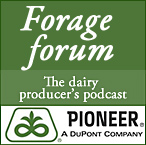Smooth transition to a new feed crop starts with analysis per back-to-basics guidelines. For example, separate the evaluations between the grass portion of your corn and the high- moisture grain. Open your mind, though, to new strategies, advises Dr. Bill Mahanna, coordinator of global nutritional sciences for Pioneer Hi-Bred. New testing methods are providing valuable information on degree of kernel … Read More
Snaplage Makes Sense for High-Moisture Harvest
While harvesting snaplage is not a new practice, it is becoming more appealing, says Dr. Bill Mahanna, coordinator of global nutritional services for Pioneer Hi-Bred. A leading reason is the advent of new, large silage choppers utilizing snapper heads with kernel processors. Primary benefits are improved tonnage with very good digestible fiber and high kernel starch. Pioneer has recently completed … Read More
What to Demand from Data
Experts agree on the basics for believability in corn silage plot data. Dr. Bill Mahanna, coordinator of global nutritional services for Pioneer Hi-Bred, details credibility thresholds for confidence in that data. He also clarifies the seven most relevant categories of silage corn data, including which ones he believes are most revealing for comparison of genetics. Supported by university studies, Bill … Read More
Raising the Bar Enhances Corn Silage
Improved fiber digestibility can be a major benefit of chopping corn silage higher, according to Dr. Bill Mahanna, coordinator of global nutritional sciences for Pioneer Hi-Bred. While raising the cutting bar reduces tonnage, Bill points out the nutritional gains can be substantially rewarding. Specific adjustments should be determined case-by-case, and he suggests what factors should drive those decisions. He also … Read More
Shared Expectations for Better Corn Silage
 An up-front dialogue between the nutritionist and custom cutter can pay dividends, says Dr. Bill Mahanna, coordinator of global nutritional sciences for Pioneer Hi-Bred. A nutritionist’s ration plans can change year-to-year, so variables such as length of chop and degree of processing should be adjusted accordingly. If the nutritionist shows desirable corn silage samples to the custom cutter and clarifies needs in advance, it diminishes subjectivity and improves everyone’s satisfaction. Bill has suggestions for encouraging this face-to-face planning. Listen to them and tell Bill your experiences.
An up-front dialogue between the nutritionist and custom cutter can pay dividends, says Dr. Bill Mahanna, coordinator of global nutritional sciences for Pioneer Hi-Bred. A nutritionist’s ration plans can change year-to-year, so variables such as length of chop and degree of processing should be adjusted accordingly. If the nutritionist shows desirable corn silage samples to the custom cutter and clarifies needs in advance, it diminishes subjectivity and improves everyone’s satisfaction. Bill has suggestions for encouraging this face-to-face planning. Listen to them and tell Bill your experiences.
Reality-Driven Pricing for Corn Silage
 Should the cost of purchasing corn silage be driven by quantity or quality? Dr. Bill Mahanna, coordinator of global nutritional sciences for Pioneer Hi-Bred, believes in retiring the 30-year-old rule of thumb, the Board of Trade price for corn times six or seven. Current lab methods and credible indexes are more accurate in determining relative values to dairy operators and fairly compensating silage growers. Bill details various pricing opportunities in a spreadsheet, which he’s willing to share. For a copy, e-mail him at bill.mahanna@pioneer.com.
Should the cost of purchasing corn silage be driven by quantity or quality? Dr. Bill Mahanna, coordinator of global nutritional sciences for Pioneer Hi-Bred, believes in retiring the 30-year-old rule of thumb, the Board of Trade price for corn times six or seven. Current lab methods and credible indexes are more accurate in determining relative values to dairy operators and fairly compensating silage growers. Bill details various pricing opportunities in a spreadsheet, which he’s willing to share. For a copy, e-mail him at bill.mahanna@pioneer.com.
Cutting Edge Alfalfa Chopping
 Dr. Bill Mahanna, coordinator of global nutritional sciences for Pioneer Hi-Bred, weighs in on the recent interest in the dairy industry about how alfalfa can and should be chopped. The catalyst is the popularity of disk mowers, which allow chopping much lower to the ground. This can increase yields, but at what cost in stand longevity and forage quality?
Dr. Bill Mahanna, coordinator of global nutritional sciences for Pioneer Hi-Bred, weighs in on the recent interest in the dairy industry about how alfalfa can and should be chopped. The catalyst is the popularity of disk mowers, which allow chopping much lower to the ground. This can increase yields, but at what cost in stand longevity and forage quality?
Pioneer Hi-Bred Introduces First Dairy Podcast
 Announcing the first podcast for dairy producers.
Announcing the first podcast for dairy producers.
